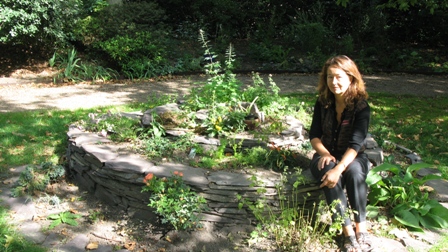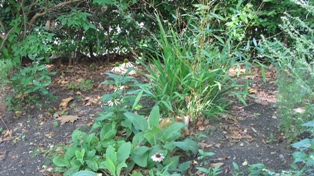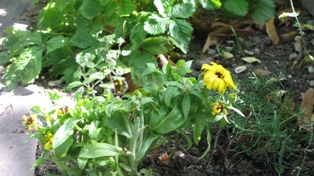| Who owns our health? Inside the medicinal garden |

|

|

|
| Features | ||||||||||||||||||||||||||||||||||||||||||||||||||||||||||||
| Wednesday, 01 September 2010 | ||||||||||||||||||||||||||||||||||||||||||||||||||||||||||||
|
The Mecklenburgh Square garden is a place of tranquility at the heart of London. It is where Dr Vivienne Lo created her history of medicine corner with over 100 plant species from China and abroad. These carefully looked after plants not only fascinate frequent visitors of the garden, but also are handy as food supplements for Vivienne and her family. More importantly, their long history and symbolic meaning can provoke deep thoughts on the timeless topics of health, tradition and self-care.
Angelica, asparagus, mints, chamomile, bamboo... every plant has a story to tell. The pine tree is a symbol of Taoism, the chili is significant for the Chinese cuisine, the rhubarb is a reminder of the historic trade conflict between Russia and China, and the opium, which is no longer legal to harvest, has greatly influenced the West’s perception towards China. Indeed, plants as food and as medicine have allowed British born Vivienne to search for and connect with her Chinese roots.
Vivienne’s father was born in a Chinese diplomat family and went to study at Cambridge University in 1936. He eventually settled in Liverpool working for the Chinese Nationalist government but started writing cookery books and opened a few Chinese restaurants in his senior years. Food became the primary way which Vivienne’s father infused Chinese culture into Vivienne’s way of life.
“Ironically, almost all my knowledge about China is taught to me by the Western world. But I learnt the important Chinese concept of self-care through food and exercise directly from my father,” Vivienne said. She learnt Chinese philosophy through practicing martial arts and her interest in Chinese medicine led her to study and practice acupuncture.
The overlap between food and medicine greatly fascinated Vivienne. “We as a family never went to the doctor.” she said. Indeed, living on dietary practices tested by thousands of years of Chinese history has allowed Vivienne to look after her own health and care for the elderly and children. “We in Europe can learn a great deal from the Chinese medicine history. Some of the concepts are ‘magical’, for example the walnut looks like the brain and eating it happens to be good for the brain. But others are just common sense, such as pregnant women should not drink alcohol.”
But where does what you eat become medicine? Vivienne asks. “In pre-modern times, all food is assigned medical value. This is the same across many cultures.” She also pointed out that our daily diets have now become too regulated, be it legal enforcements or recommendations by Waitrose packaging. “There exists a communication gap between patients and their doctors. Patients receive medicines which they do not understand and receive very limited information on how to use food to create a healthy living.”
In fact, her medical garden is a quiet protest against the system where the power to prescribe medicine is put in the hands of the few. “Who is to say that housewives cannot plant and harvest medicinal herbs in their gardens? The benefit and harm of all food substances depend on how they are used. For example, rhubarb roots in my garden are poisonous if eaten raw, but are one of the best Laxatives if boiled properly. On the other hand, many common foods that seem harmless, such as carrots, can be very damaging if taken in great quantity.”
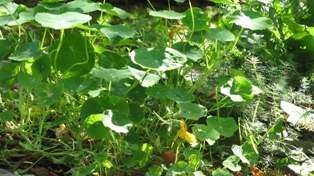 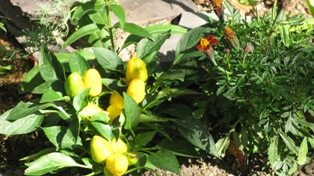 In Vivienne’s garden is also a spiral, made from slates taken from the mountains of Snowdonia where her mother lived. The slates were transported to London by a Welsh farmer and arranged into the structure by stone workers in February. The structure facilitates good drainage as drier plants are planted at the top, allowing the excess water to seep through to plants requiring more water lower down the spiral.
“Growing these plants has been an intellectual activity for me. When I started the spiral I also started thinking about holding a conference on exploring the boundary between food and medicine.” Much hard work has allowed Vivienne to finally present her attentively organized conference “Potent Substances: the Boundaries of Food and Medicine”, which will take place between September 13-15. The event aims to offer recommendations for both policy and practice in relation to the boundaries of food and pharmacy and will draw on the interdisciplinary knowledge of the participants.
This conference is significant also because it contributes to discussions on the regulation of medicine when UK’s Chinese medicine industry is facing a turning point. In 2004, a European directive came into force requiring all medicines sold in member countries to obtain a licence. UK has delayed implementing this directive but April 2011 is the deadline. So far no Chinese medicine has been granted a licence, and the high cost and complexity of the application process means that many Chinese medicines may suddenly become inaccessible after next April.
Earlier this year civil servant Patricia Booth had her kidneys "destroyed" after taking pills alleged to have been provided by a Chinese medicine shop. Many policy makers and medical experts cited this as an example to show that Chinese medicine requires strict regulation. But Vivienne disagrees. “Statistically, one in ten patients who go into hospital ends up with a new problem that they did not have before going. Here we see one case of Chinese medicine causing a problem, but over the years Chinese medicine has successfully cured so many other people’s problems.
“The unfortunate truth is that there is a witch-hunt for Chinese medicine practitioners and their mistakes. What we need is education, which allows people to use Chinese medicine safely, and not regulation that will deny many the chance to practice medicine.” Believing that wisdom passed down from the long history of Chinese medicine will empower the ordinary citizen to take control of their own health, Vivienne looks forward to more and better quality courses and discussions on Chinese medicine in the near future.
Cecily Liu
Contact the reporter: This email address is being protected from spam bots, you need Javascript enabled to view it 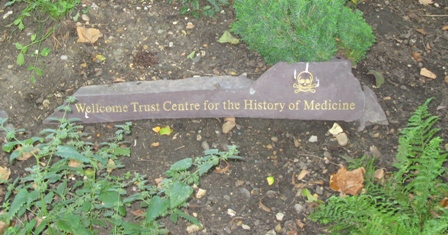 For more information on Vivienne’s conference, visit: http://www.dimsum.co.uk/whats-on/potent-substances-on-the-boundaries-of-food-and-medicine.html
To download a .pdf with details of the conference, please click here. To download a .pdf with details of the speakers, please click here. To download a registration form .pdf, please click here. To see a video of Vivienne introducing her spiral, visit: http://www.ucl.ac.uk/news/news-articles/1007/10072301 To follow the debate on UK’s regulation of Chinese medicine, visit: http://www.dimsum.co.uk/features/the-future-of-chinese-medicine-in-the-uk.html
|
||||||||||||||||||||||||||||||||||||||||||||||||||||||||||||






